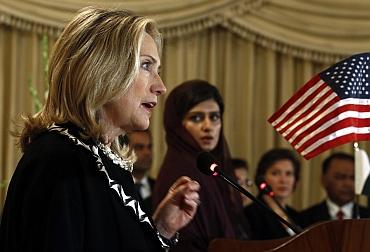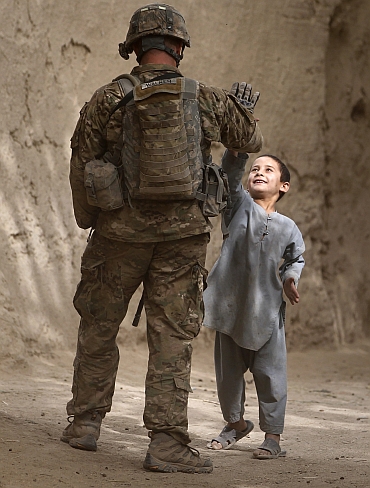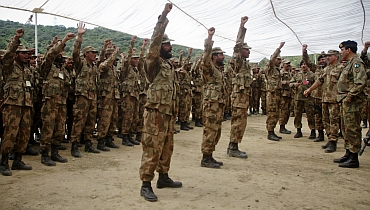 | « Back to article | Print this article |
Can the United States 'contain' Pakistan?
While the United States is unlikely to launch an attack on Pakistan, the US military build-up on the Pak-Afghanistan border is the opening salvo to unfurl a "containment strategy" toward Pakistan, says M K Bhadrakumar
The unthinkable seems to be happening. There is growing talk about a military conflict of some sort erupting on the Afghan-Pakistan border. With unprecedented candour, Pakistan Army Chief Ashfaq Pervez Kayani admitted that he wouldn't rule out an attack by the United States on Pakistan.
The British newspaper The Independent since quoted Pakistani army sources that the growing concentration of the United States troops in the eastern sector of the Afghan-border signifies a "co-ordinated" move. The remarks on Tuesday by the Pakistani army chief, warning the US against any attacks on Pakistan, fall into perspective.
It may be useful to peer into the dark void that is developing in regional security, which an American military attack on Pakistan will most certainly precipitate, and try to figure out what it entails.
The core issue is what tangible gain could come out of a military move against Pakistan at this point. As a commander-in-chief, Barack Obama would have asked by now. A military conflict with undefined, uncertain objective is bound to lead to unforeseen consequences. As a politician gearing up for a tough electoral battle, too, a military conflict involving US troops and likely war casualties wouldn't suit Obama.
Click NEXT to read further...
Afghan war cannot be won militarily
Proxy war
The starting point is that the Afghan war cannot be won militarily. The US's doublespeak about the Haqqanis speak volumes about its own losing faith in the war. Hardly two months ago, US officials sat down with the Haqqani leadership in the presence of the head of Pakistan's Inter-Services Intelligence. Back channel is at work even today between the US and the Haqqanis and, conceivably, the ISI is continuing to provide its services as the facilitator. So, what happened all of a sudden?
Presumably, any US attack on Waziristan in Pakistan's tribal areas would be predicated on the faint hope of dividing the Pashtuns. But no matter the factionalism within the Taliban and the US's success -- to a very limited extent, if any -- to drive temporary wedges into that factionalism, Pashtuns have a great tradition of getting together whenever they come under attack by a foreigner.
Even the participation of the units of the Afghan forces in any US attack on Waziristan will not change the alchemy. In fact, given the preponderance of the Tajiks in the Afghan security and military establishment, the ethnic Pashtun alienation may even exacerbate to a point of no return.
In a counter-insurgency war, an attempt will be made at some point to create a force of mercenaries drawn from the insurgents' ranks. The mercenaries help to make the war bloodier, make the battleground muddier and help obliterate the battle lines and they enjoy the latitude to operate in a grey zone where international laws on war crimes do not apply. But they have seldom if ever won a war.
Plainly put, the US has been using the "Pakistani Taliban" for sometime already to create havoc within Pakistan and the "proxy war" has finally burst into the open with the factual allegation by the Pakistani military this week that the US-led coalition in eastern Afghanistan is ignoring Islamabad's requests to follow up on specific intelligence regarding the Pakistani Taliban leadership who operate out of the sanctuaries on Afghan territory and indulge in cross-border terrorism.
Meanwhile, the "Pakistani Taliban" groups -- rather, some of them -- have been rachetting up the pressure on the Pakistani military in the past year or two by attacking its military installations (including in Rawalpindi), military bases and cantonments and even the headquarters of the Inter-Services Intelligence. Quite obviously, Pakistani military understood the political message behind these attacks. But this has still not compelled the Pakistani military to fall in line with the US's regional strategy in Afghanistan. In other words, Washington kept steadily raising the threshold of "pain" for the Pakistani generals in the "proxy war", but of no avail.Pak military convinced that US strategising to defang it
On the other hand, Taliban and the ISI have largely succeeded in thwarting or rolling back the US stratagem to split the insurgent groups. The fashion in which the US's famous Taliban interlocutor Tayeb Agha has been "silenced"; the tragi-comic incident of the North Atlantic Treaty Organisation forces and the US talking in great earnestness with a Taliban "imposter" out of sheer innocence regarding his identity as a petty shopkeeper; or, the sudden disappearance of Mullah Abdul Ghani Baradar from the playpen -- all these only underscore the paradox that it actually suits Pakistan if the insurgent groups are scattered.
Assymetrical response
Washington has carefully timed the decision to amass its troops on the Afghan-Pakistan border to coincide with the massive two-month long Indian military exercise currently under way on the India-Pakistan border region aimed at testing out the Indian doctrine to capture and hold territory deep inside the "enemy" lines.
If Washington's calculation is to apply the maximum psychological pressure on the Pakistani military, it only betrays its lack of comprehension of what is prompting the Pakistani military leadership to resort to such "strategic defiance". (Pakistan, incidentally, is downplaying the Indian military exercise and the few instances of unwarranted rhetoric and on the contrary, it is ostentatiously spreading petals of goodwill on India's path.) What the US needs to face up to is that rightly or wrongly, Pakistan no longer trusts the US's intentions. The Pakistani military is convinced that the US is working on a strategy to "defang" Pakistan by seizing its nuclear-weapon stockpile. Obviously, there is no leeway for compromise as far as the Pakistani military is concerned.
The Pakistani military has also refused to fall into the trap of launching a full-fledged operation in North Waziristan, which, it knows fully well, can only become a quagmire of such proportions that the military juggernaut itself might ultimately disintegrate. The Pakistani civil and military leaderships are today agreed that the only means to pacify the tribal areas is through networking with the tribal chieftains and the various militant groups and that is going to be a long haul and, in the meanwhile, Pakistan is not going to be hustled by the US into precipitate actions.
The Pakistani generals are a rational lot who would know their capabilities and limitations. Some have rushed to interpret Kayani's statement on Tuesday as "nuclear blackmail." But the Pakistani military leadership is not going to "nuke" the US troops if the latter make incursions into Pakistani territory. The deployment of regular troops on the border suggests that the Pakistani military will resist and make the US pay a high price in casualties that Obama simply cannot afford as a badly-battered politician gearing up for a crucial election campaign.US attack on Pak will shut door for political settlement in Kabul
The strong likelihood is that the shadow boxing and high-pitched rhetoric that has been going on between the US and Pakistan ever since the Raymond Davis affair in January (when the ISI and the military leadership came to know the full extent of the US' covert operations inside Pakistan) will blossom into a full-fledged "asymmetrical war". Taking all factors into consideration, therefore, a US attack on Pakistan is only going to ensure that the Taliban would have access to a seamless reservoir of manpower (and equipment and supplies) to carry on with the insurgency. In political terms, the insurgency will come to assume the nature of a war of "resistance".
How does that help the US? Given the current state of play on many attendant fronts -- opposition to the war in the western public opinion, US's and Eurozone countries' economic crisis, countless failings of the Kabul set-up in governance, debilitating weaknesses of the Afghan armed forces, overall lawlessness and corruption swarming Afghanistan -- Pakistani military leadership is justified in assessing that an assymetrical war can only work to Pakistan's advantage.
On the other hand, the US attack on Pakistan will conclusively shut the door to the avenue leading to a political settlement in Afghanistan. Pakistan's response will be to hunker down and continue to defy the US diktat. In the process, something of fundamental significance with grave long-term implications may also be happening to Pakistan's political economy. Suffice to say, if Nawaz Sharif was found to be an unsavoury choice as Parvez Musharraf's potential successor and if Washington did everything possible to keep this mass leader from the corridors of power solely because of his dubious "Islamist" baggage, the US may now have to learn to live with something far worse in Pakistan.
Of course, Pakistan is no Cambodia and it will not disintegrate into anarchy. The Pakistani state is strong enough by the South Asian standards to survive. But that will be small comfort since the US will have "lost" Pakistan -- for a while at least. It is for the political masters in Washington to judge how that, in turn, would serve the US' regional strategies in the highly-strategic region that forms the tri-junction of Central Asia, South Asia proper and the Persian Gulf. What happens to the New Silk Road project?
In sum, logically speaking, better sense should prevail in Washington than launch a military strike against Pakistan.
US should drastically cut down military assistance to Pak
Masks and masquerade
Bit then, there is another way of looking at the paradigm, too. A US military attack on Pakistan may almost certainly be the opening salvo to unfurl a "containment strategy" toward Pakistan. Indeed, Bruce Riedel, former Central Intelligence Agency officer who advised Obama on the Afghan war, espoused in a provocative article in the New York Times over the weekend that the United States should pursue a 'containment' policy toward Pakistan.
Riedel got the big picture absolutely right by estimating that the US needed a new policy toward Pakistan since the two countries' "strategic interests are in conflict, not in harmony." He also cannot be faulted for projecting the wish list that the US must "contain the Pakistani Army's ambitions" so that civilian supremacy got asserted in Islamabad and Pakistan's foreign policy took a "new direction."
Now, how does a "containment" strategy toward Pakistan can be made to work? To begin with, Riedel argues, by disabusing the Pakistani generals of the notion that "NATO is doomed to give up in Afghanistan, leaving them [Pakistani top brass] free to act as they wish there." But then, arguably, it is widely known in the region today, including in Pakistan, that the US is not going to cut and run from Afghanistan. Evidently, the bone of contention between the US and Pakistan is about the nature of an Afghan settlement that accommodates Pakistan's legitimate interests rather than about the American presence.
Two, most interestingly, Riedel recommends that the US needs to craft a "more hostile relationship" which will be "a focused hostility... holding its [Pakistan's] army and intelligence branches accountable." Now, this can be achieved if there is a US military incursion into Pakistani territory, which the Pakistani military fails to prevent.
Three, the US should drastically cut down military assistance to Pakistan, while continuing with "regular contacts between our officers and theirs, but under no delusion that we are allies." But, Kayani has revealed that Pakistan has already conveyed to the US that it doesn't need any US military aid. And in any case, out of the grand figure of 6 billion dollars that the US magnanimously pledged as military aid for Pakistan, the latter apparently managed to get only 200 million dollars so far. So, this "carrot-and-stick" approach is not the real thing.
Containment strategy to work if it's backed by regional consensus
Most important, Riedel concludes his voyeurism with the categorical affirmation the US needs military bases in Afghanistan, if it is to pursue the "containment" strategy. He says the US should not have "false hopes for a political solution" in Afghanistan and should switch to a strategy riveted on building an Afghan army that can "control the insurgency with long-term NATO assistance and minimal combat troops."
Riedel's blueprint to contain the Pakistani Army's "aggressive instincts" and to help the emergence of a "progressive Pakistan" even while "keeping up the fight against terrorism" has been outlined in great seriousness. Its presentation by the New York Times suggests that it should not be taken lightly. Indeed, Riedel is wired into the Washington military establishment.
All in all, Riedel's laboured justification for the establishment of US military bases in Afghanistan happens to be masqueraded as the need to pursue a "containment" strategy toward Pakistan.
Obama would know well enough that a "containment" strategy could only succeed if it is backed by a strong regional and international consensus to isolate the country in question. Ideally, the strategy needs to be pursued by creating an alliance of nations that subscribes to a common strategy. In the case of Pakistan, these prerequisites are totally lacking. Pakistan does not face regional isolation. On the contrary, it is networking actively with almost all regional players (with the exception of India) on the Afghan problem -- Iran, Russia, Tajikistan, China, Uzbekistan, Turkmenistan, etc. The US would have an uphill task to get the countries in the region to fall in line with a containment strategy toward Pakistan.
Besides, a containment strategy takes a long time to work, if at all. (It has been in operation against Iran for over 3 decades with hopeless results.) Does Obama have that much time in hand in Afghanistan? Indeed, if the "Occupy Wall Street" movement is any reflection of the public mood in the US, Afghan war is a low priority in the national agenda.
Nonetheless, a containment strategy nonetheless fits in with the US's geopolitical objectives. What is unfolding on the ground on the Afghan-Pakistan border region does fit into a bizarre pattern. The US's real intention seems to be to create the political and security conditions in the "post-Osama bin Laden phase" in Afghanistan that would give raison d'etre to the establishment of long-term military presence in Afghanistan.
The US's expectation would be that the kaleidoscope of US's ties with Pakistan can always be tilted once the Washington-Kabul strategic agreement and the NATO summit in Chicago in May go through, irrevocably establishing the western military presence in Afghanistan. Precipitating a crisis in the relationship with Pakistan at this juncture becomes a geopolitical necessity for the US despite its apparent madness. It is a dangerous game.
M K Bhadrakumar is a former Indian diplomat.





